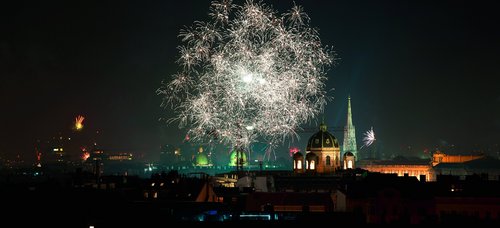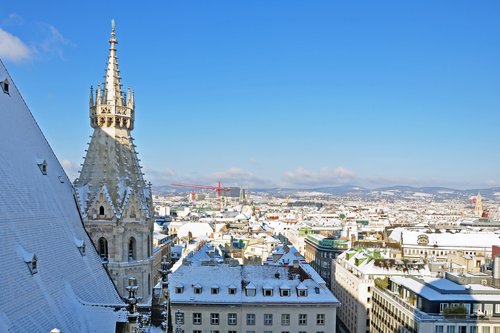City Breaks along the Danube
Experience the three wonderful districts of the Hungarian capital on a city trip to Budapest.
Buda is characterised by a hilly landscape and numerous noteworthy sights. Pest and Óbuda, on the other hand, are somewhat flatter, but offer just as many destinations worth seeing. Be enchanted by the charm of the Hungarian metropolis: Walk through Budapest and trace the history of its Ottoman rulers, the ornate era of the House of Habsburg or Soviet Socialism. Budapest is a city with a variety of cultural areas, which come together to create a colourful and lively metropolis.
The Fishermen’s Bastion and the Parliament Building are steeped in history. You can shop to your heart’s content in the market hall. As well as fresh fruit and vegetables, fish, spices and other delicacies from all over the world are just waiting to be discovered. After an exciting tour of discovery, take a break in the Széchenyi spa and relax in the idyllic surroundings of the city forest. Other monuments, museums and ornate buildings make Budapest an attractive destination.
City Trip to Budapest by ship
Step on board the A-ROSA cruise ships and discover Budapest from the river.
You will dock directly in the centre of the city during a Danube cruise with the A-ROSA BELLA, the A-ROSA DONNA, the A-ROSA MIA, the A-ROSA RIVA and the A-ROSA FLORA. Join one of our guided tours with a guide who knows their way around or explore the city by yourself. In the evening, it’s time to head back to the ship and enjoy the A-ROSA feel-good programme. Relax in our SPA area or talk about your experiences with fellow travellers during the evening dinner while the lights of the city roll past and your ship continues in the direction of Bratislava or Vienna.

A-ROSA River Cruises to Budapest
The best Sights and Destinations in Budapest
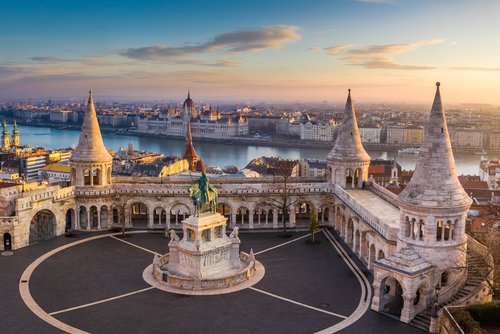
FISHERMEN’S BASTION OF BUDAPEST
High up on the castle hill, where the fish market was situated in the Middle Ages, the Fishermen’s Bastion of Budapest towers over the city. The building owes its name to the fisherman’s guild for which the Bastion was built. In the Middle Ages, this guild was supposed to defend that part of the city wall. With its conical towers, the building is a real eye-catcher. Today, it’s a wonderful place to take in a view of the Danube and the district of Pest. The monument was built between 1895 and 1902.
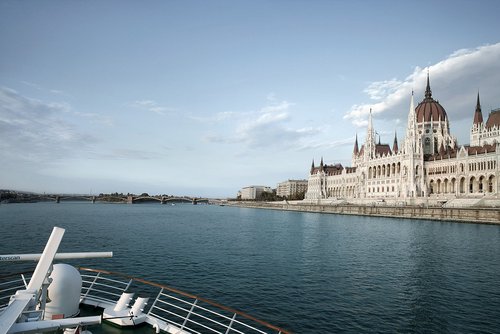
CITY PARLIAMENT
The Parliament Building is home to the Hungarian parliament. As well as this, the grand building is the landmark of the Hungarian capital. The Hungarian Parliament Building was supposedly modelled after the Palace of Westminster, which houses the British Parliament in London. The architectural masterpiece was built in just 22 years, to mark the millennium in 1896. At 96 metres in height, 268 metres in length, 118 metres in width and with a total of 691 rooms, it presents a more than impressive achievement.
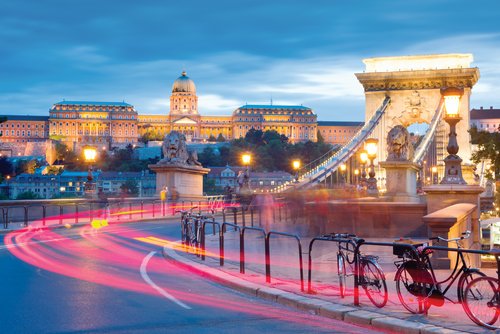
BUDA CASTLE
Buda Castle, otherwise known as the Royal Palace, is situated on the Castle Hill and is the largest building of the Hungarian metropolis. Take in the view of Budapest from the highest building in the city. The history of the palace dates back to the 13th century. King Béla IV had a castle built at this time. Over the following centuries, the building was expanded during the reigns of various sovereigns before finally becoming the ornate palace that majestically overlooks the Hungarian capital.
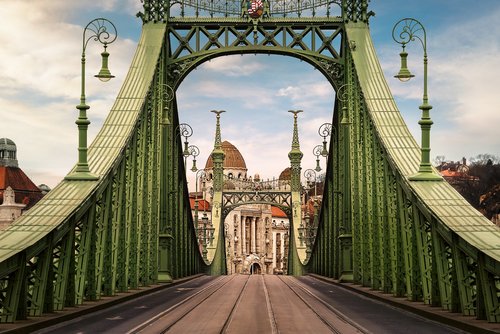
BUDAPEST´S CHAIN BRIDGE
Budapest’s Chain Bridge, also known as the Széchenyi Chain Bridge, stretches majestically across the Danube. It links the István-Széchenyi Square with Adam Clark Square. The suspension bridge was built in the Classical style. The iron chains of the bridge structure run through the pillars. The Chain Bridge connects the two districts Buda and Pest, which are separated by the Danube. Building began in 1839 and lasted around ten years. The Chain Bridge is the oldest bridge in Budapest.

SZÉCHENYI THERMAL BATH
The Széchenyi Thermal Bath is not just popular with the locals. Even tourists appreciate the extensive spa experience. The thermal bath is in the middle of the city’s forest and invites you to come in and relax. Construction of the regal building began in 1909. The size of the bath is particularly notable – it is thought to be the largest thermal bath in Europe. The facilities include a thermal bath, a swimming pool and a clinic. The recreation centre was named after Count István Széchenyi.

ST STEPHENS BASILICA
In the district of Pest, directly next to St Stephen’s Square, you will find St Stephen’s Basilica. It was opened in 1905 and has been the largest church in the Hungarian city ever since. The Classical church houses many relics. It is a very attractive destination for religious tourists. One of the most significant relics is the right hand of Hungarian king and founder Stephen I. From 1000 to 1038, he was the first king of the Kingdom of Hungary. Today, he is considered the patron saint of the ornately decorated basilica.

THE BUDAPEST MARKET HALL
Welcome to the heart of the city! The central market hall, which was based on a basilica, is one of Budapest’s landmarks. More than 180 market stalls, shops and two supermarkets fill three floors. The range of food on offer is breathtaking. Fresh vegetables, fresh fruit and colourful spices from all over the world. Drift away and discover new delicacies hidden around every corner. The façade of the market hall is filled with glazed bricks, making the building a real eye-catcher.
HUNGARIAN STATE OPERA
The Hungarian State Opera is situated in the district of Pest in Budapest. The ornate opera house was built at the end of the 19th century and today enriches Budapest with its diverse theatrical performances. Prestigious conductors showcase their skills in the historical building. The opera house was built in the style of the Renaissance Revival. Elegant ornaments and Baroque elements decorate the building, as do sculptures and paintings. In the auditorium and the staircases, you can enjoy looking at valuable wall paintings by renowned Hungarian artists.


